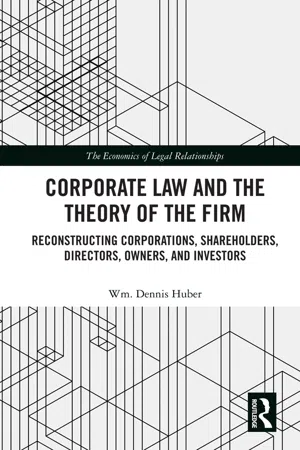1 Property and property law
Introduction
Economics, as defined by every introductory economics textbook, is the science of the allocation of scarce resources. Property in its various forms constitutes resources to the owner of the property. Property law is the legal structure that determines who owns the property (e.g., government or private persons), which resources are allocated and controlled (labor or capital), and how they are allocated and controlled (market or centrally planned by the government).
In this chapter, I review the basics of private property law, including types of private property and ways by which private property may be owned. Understanding basic property law is necessary to understand the relationship between corporations and property, shareholders and property, and shareholders and corporations. It is important to understand the nature of private property and property laws in order to understand the allocation of resources of production and the economic theory of the firm.
Private property in the United States
Our modern concept of private property1 and property laws is centuries old, arising in common law. Private property, although not property law, is entrenched in the American Constitution. The Bill of Rights guarantees that “No person shall … be deprived of life, liberty, or property, without due process of law; nor shall private property be taken for public use, without just compensation.”2 The Fourteenth Amendment further guarantees that “[No] State [shall] deprive any person of life, liberty, or property, without due process of law.”3
The Constitution never defines “property” or how property may be owned. Nor does the Constitution form the basis of property laws. Definitions of property and laws of property are left to the states and to common law. As the Supreme Court ruled in Ruckelshaus v. Monsanto Co.,4 “[p]roperty interests … are not created by the Constitution. Rather, they are created and their dimensions are defined by existing rules or understandings that stem from an independent source such as state law.” Only state law can define the legal parameters of ownership of private property as a result of the Tenth Amendment: “The powers not delegated to the United States by the Constitution, nor prohibited by it to the States, are reserved to the States respectively, or to the people.”5
State property laws are largely the product of common law, but also some statutory law, depending on the type of property. According to Posner (2014), common law, when viewed from an economic perspective, includes the law of property (creating and defining property rights) and the law of contracts (facilitating the voluntary transfer of property rights).
Prior to examining laws concerning private property, we must understand the various types of private property and methods of ownership. The method of ownership of private property depends on the type of property. There are various types of private property, each of which must be considered prior to examining private property within the context of shareholders and corporations. For example, the Delaware General Corporation Law6 and New York Business Corporation Law7 itemize the types of property a corporation may own, how it may acquire property, and what the corporation may do with the property. The Delaware General Corporation Law also declares that shares of stock owned by a stockholder are personal property.8
Furthermore, economics, as defined by every introductory economics textbook, is the science of the allocation of scarce resources. Property in its various forms constitutes resources to the owner of the property. Property law is the legal structure that determines who owns the property,9 which resources are allocated to production, who controls the resources, and how they are allocated and controlled (Yuille, 2015). It thus behooves us to understand types of private property and laws of ownership of private property in relation to shareholders and property, shareholders and corporations, and corporations and property. Property law determines the ownership of resources and the ownership of the firm10 while agency law determines the relationship of directors and shareholders, which is discussed in the next chapter.
Berle and Means’s (1991) The Modern Corporation and Private Property failed to provide a systematic discussion of private property or property rights or how such rights are established or forfeited or an analysis of types of property and types of ownership (Hessen, 1983). A study of corporate law and the theory of the firm must begin with a study of types of private property and property law.
Types of private property
The term “property” has no universally accepted definition within Anglo-American jurisprudence (Yuille, 2015; Morales, 2013). Property refers to a legal interest in, or relationship to, either a physical or non-physical object, or a bundle of rights recognized in the object.11
Property describes the rights the owner has over a thing, rather than the thing itself. “[N]early everyone agrees that the institution of property is not concerned with scarce resources themselves (‘things’) but rather with the rights of persons with respect to such resources” (Morales, 2013, quoting Thomas Merrill, Property and the Right to Exclude, 77 Nebraska Law Review, 1998).
In rem rights attach to the thing, i.e., attach to the property itself, while in pesonam rights attach to the owner of the thing (Morales, 2013).12 In rem rights are generally rights pertaining to real property13 while in pesonam rights generally pertain to personal property (Morales, 201...
